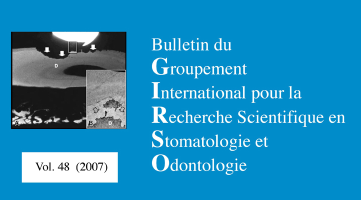Assessment of oral status and oro-pharyngeal candidosis in elderly in short-term hospital care
Abstract
Objectives: to evaluate prevalence of oral candidosis and predisposing conditions in hospitalized elderly patients. Design: we examined 104 elder patients recently hospitalized in two geriatric hospitals for short-term hospital care. Methods: information was collected on patients' sex, age, mental and physical disabilities, smoking habits, medical prescriptions, oral pathologies, denture wearing, oral hygiene habits and oral hygiene level. Quality of existing dentures was evaluated. Oral mucosae were examined for clinical signs suggesting oral candidosis. Semiquantitative cultures of Candida were carried out to confirm the clinical diagnosis. Results: the diagnosis oral candidosis was confirmed in 18/54 patients showing clinical signs of oral candidosis. Confirmed oral candidosis was associated with the presence of other infections, proteo-caloric denutrition, ongoing antibiotic therapy, and denture wearing. Dentures in patients with confirmed oral candidosis at poorer technical quality of the acrylic surface in contact with the underlying mucosa. Conclusion: the wearing of removable dentures is a major predisposing factor for oro- pharyngeal candidosis of elderly patients in short-term hospital care. Appropriate oral and denture hygiene measures as well as denture wearing habits should be introduced or maintained to prevent this infection.Downloads
Published
Issue
Section
License
I hereby certify that the authors of the above manuscript have all:
1. Conceived, planned, and performed the work leading to the report, or interpreted the evidence presented, or both;
2. Written the report or reviewed successive versions and shared in their revisions; and
3. Approved the final version.
Further, I certify that:
1. This work has not been published elsewhere and is not under revision in another journal;
2. Humane procedures have been followed in the treatment of experimental animals (if applicable);
3. Investigations in humans was done in accordance with the ethical standards of the responsible committee on human experimentation or with the Helsinki Declaration (if applicable).
4. This paper has been carefully read by a native English speaker who is familiar with the field of work (this applies to authors who are not fluent in English); and
5. The copyright of the article is transferred from the authors to the Bulletin du Groupement International pour la Recherche Scientifique en Stomatologie et Odontologie upon acceptance of the manuscript.



